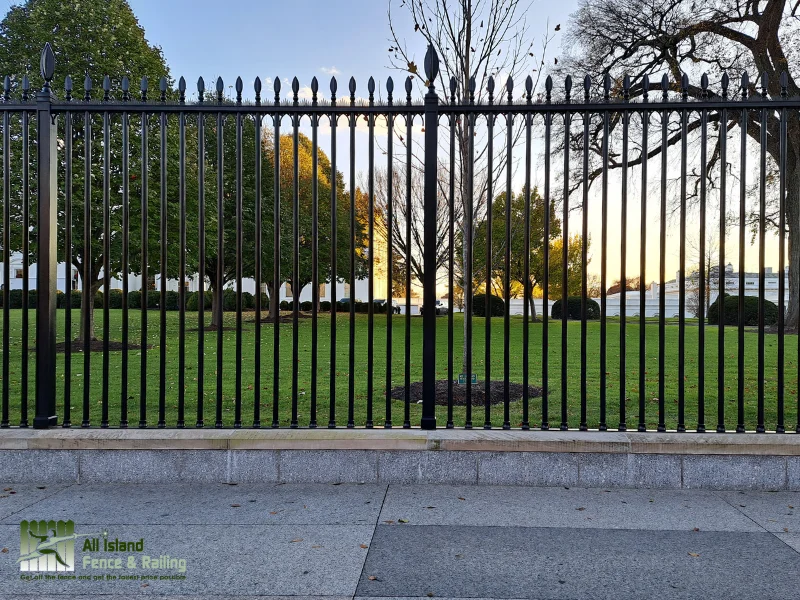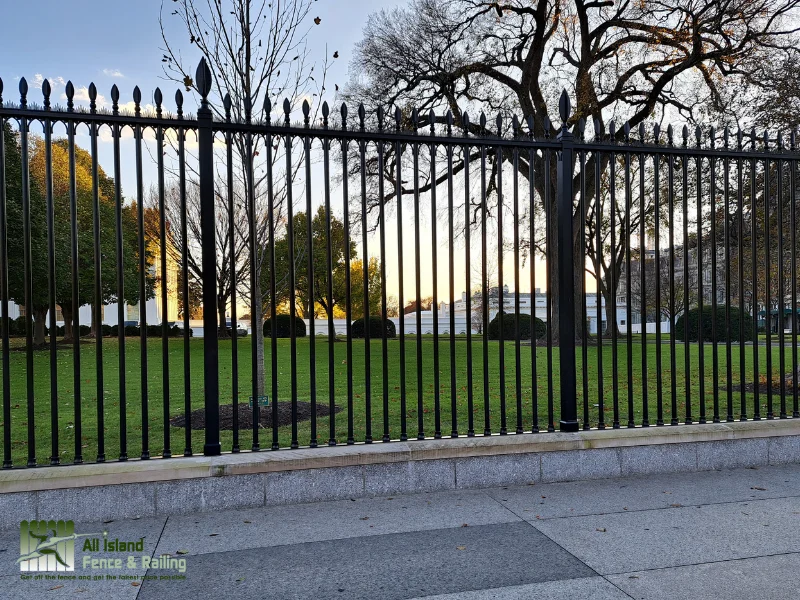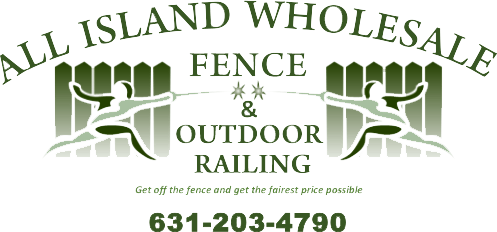If you’re contemplating the addition of an aluminum fence to your property, you’ve likely found yourself pondering a crucial question: “How much does an aluminum fence cost?” This comprehensive guide will be your compass in navigating the intricate landscape of aluminum fencing pricing, ensuring that you’re well-informed and ready to make a decision that suits your needs and budget.
How Much Does Aluminum Fencing Cost?
The price of an aluminum fence can vary significantly based on a multitude of factors. In this in-depth exploration, we will dissect each of these variables to provide you with a comprehensive understanding of aluminum fencing costs.

Cost Estimator by Size
One of the most fundamental aspects impacting the cost of an aluminum fence is its size. Simply put, the larger the area that requires fencing, the more materials will be needed, and consequently, the higher the cost.
Before diving into the intricacies of styles, accessories, and other considerations, it’s crucial to begin with a precise measurement of the area you intend to enclose. This preliminary step will provide you with a foundation for estimating costs accurately. Remember, a precise measurement can save you both time and money by preventing over-purchasing of materials.
Explore our premium aluminum fence collection for durable and elegant solutions at AllIslandFence.com
Other Factors That Affect Cost
Let’s explore various factors beyond size that can significantly influence the total cost of your aluminum fencing project:
Pool Fence Cost: If you’re considering an aluminum fence for your pool area, additional safety measures may be necessary to meet local regulations. These additional features, such as self-closing gates or childproof locks, will impact the overall cost.
Aluminum Fence Gates: The inclusion of gates within your fencing project introduces an additional layer of complexity to the cost equation. Gate sizes, types, and the number of gates required will all affect the final expense.
Discover the beauty of our aluminum fence designs! Contact us to know more about our premium fencing solutions at All Island Fence.
Aluminum Fence Styles: Aluminum fences come in an array of styles and designs, from simplistic and functional to ornate and decorative. The choice you make here can significantly influence the cost. More intricate designs may require more material and labor to create, thereby increasing the overall expense.
Decorative Options: To personalize your aluminum fence and add a touch of elegance, you can opt for decorative elements such as finials, scrolls, or other ornamental details. While these embellishments enhance the visual appeal of your fence, they do come at an additional cost.
Fence Height: The height of your fence is another crucial factor. Taller fences require more materials and labor, thus driving up the cost. Consider your specific needs for privacy, security, or aesthetics when deciding on the appropriate fence height.
Fence Thickness: The thickness or gauge of the aluminum used for your fence can impact both its durability and its initial cost. While thinner gauges are more affordable, thicker gauges offer increased strength and longevity.
Color: Many aluminum fences are available in a variety of standard colors. However, if you desire a custom color to match your property’s aesthetics, expect to pay a bit more for this unique feature.
Permits: Depending on your location and local regulations, you may need permits to install a fence. The cost of permits can vary widely, and it’s essential to check with your local government to ensure compliance. Failure to obtain the necessary permits can result in fines or the removal of your fence, making it a critical cost consideration.
Time of Year: The timing of your fence installation can also influence pricing. Some contractors offer discounts during the offseason, which can result in cost savings. Conversely, busy seasons may lead to higher labor costs due to increased demand.
Extra Services: Beyond the fence itself, there are several additional services that might be required, depending on your specific situation:
- Land Grading: If your property is uneven or requires leveling before fence installation, land grading can be a necessary expense.
- Fence Removal: If you have an existing fence that needs removal, this will incur an additional cost.
- Tree or Bush Removal: Clearing the area where the fence will be installed may necessitate the removal of trees or bushes, which can add to the overall project cost.
- Painting: While most aluminum fences come pre-finished, some homeowners may opt for custom painting. Painting adds a layer of protection and personalization to your fence, but it does come at an extra cost.
- Pressure Washing: To maintain the appearance of your aluminum fence over time, periodic pressure washing may be required.

Cost of Installing an Aluminum Fence DIY
For those with a penchant for DIY projects, installing an aluminum fence yourself can be a cost-effective option. However, it’s crucial to consider the following factors before embarking on this endeavor:
- Equipment Needed: DIY fence installation requires specific tools and equipment. Commonly needed items include post-hole diggers, a level, a mallet, a saw, and measuring tools. Some of these tools you may already own, while others can be rented from local hardware stores.
- Cost of Materials: The primary expense for a DIY aluminum fence project is the cost of materials, including aluminum fence panels, posts, gates, and any additional accessories or hardware.
How to Install an Aluminum Fence DIY in 7 Steps
If you decide to take on the challenge of a DIY aluminum fence installation, it’s essential to follow a structured process to ensure a secure and aesthetically pleasing outcome.
Here are seven steps to guide you:
- Planning and Design: Start by designing your fence layout and determining the required materials.
- Gather Tools and Materials: Acquire all necessary tools and materials, including posts, panels, gates, and any additional components.
- Mark Fence Line: Use string or stakes to mark the fence line, ensuring it follows your predetermined design.
- Dig Post Holes: Dig post holes at regular intervals along the fence line, adhering to your design plan.
- Install Posts: Set the posts in concrete and allow them to cure.
- Attach Panels and Gates: Attach the fence panels and gates to the posts, ensuring everything is level and secure.
- Finishing Touches: Make any necessary adjustments, and finish by adding decorative elements or post caps, if desired.
It’s essential to note that DIY installations can be time-consuming, and achieving professional-quality results may require significant effort and skill.
DIY Cost vs. Professional Installation Cost
While DIY installations can save on labor costs, there are several key factors to consider when deciding between DIY and professional installation:
- Skill and Expertise: Professional installers bring years of experience and expertise to the job, ensuring that your fence is installed correctly and efficiently. DIY installations may require a steeper learning curve and may not achieve the same level of precision.
- Time Commitment: Installing a fence, even with the help of friends or family, can be a time-consuming endeavor. Professionals can typically complete the job more quickly.
- Warranty: Many professional installations come with warranties, providing peace of mind that any issues or defects will be addressed promptly.
- Customization: Professional installers can offer customization options and advice that may not be readily available for DIY projects.
- Cost of Mistakes: If a mistake is made during a DIY installation, it can be costly to rectify. Professional installers are less likely to make errors, and if they do, they are responsible for correcting them.
Ultimately, the decision between DIY and professional installation should be based on your skill level, available time, and budget.
Cost of Aluminum Fencing by Location
In addition to the factors mentioned above, the geographical location of your property can also impact the pricing of aluminum fencing. Costs can vary based on regional labor rates, material availability, and local building codes. It’s advisable to obtain multiple quotes from local contractors to gain a more accurate understanding of pricing specific to your area.
FAQs
To further aid your quest for clarity regarding aluminum fencing costs, we’ve compiled a list of frequently asked questions:
- What is the average cost per linear foot for aluminum fencing?
The cost per linear foot can vary significantly based on the factors mentioned earlier. On average, you can expect to pay between $20 and $40 per linear foot for a standard aluminum fence. However, prices can go higher for custom designs or additional features. - Do I need a permit to install an aluminum fence?
Permit requirements vary by location and may depend on factors such as fence height and location. Check with your local building department to determine if a permit is required for your project. - How long does it take to install an aluminum fence?
The installation time can vary based on the size and complexity of the project. On average, a professional installation can take several days to a week, while a DIY installation may take longer, depending on your experience and available help. - Are there any maintenance costs associated with aluminum fencing?
Aluminum fencing is relatively low maintenance compared to other materials like wood. However, periodic cleaning and inspections are recommended to ensure its longevity. - Can I install an aluminum fence on my own?
While DIY installation is possible, it requires careful planning, the right tools, and some level of construction skill. If you’re not confident in your abilities, it’s advisable to hire a professional installer. - Can I customize the color of my aluminum fence?
Many aluminum fence manufacturers offer a range of standard colors, and some may offer custom color options for an additional cost. - What are the advantages of aluminum fencing over other materials?
Aluminum fencing is known for its durability, resistance to rust and corrosion, and low maintenance requirements. It also offers a wide range of styles and designs, making it suitable for various applications.
In conclusion, unraveling the intricacies of aluminum fencing costs is a critical step in making an informed decision for your property. By considering factors such as size, style, accessories, and location, you can confidently embark on your aluminum fencing project, enhancing the aesthetics, security, and value of your home. Whether you choose to go the DIY route or opt for professional installation, this guide equips you with the knowledge needed to navigate the world of aluminum fencing pricing effectively.









